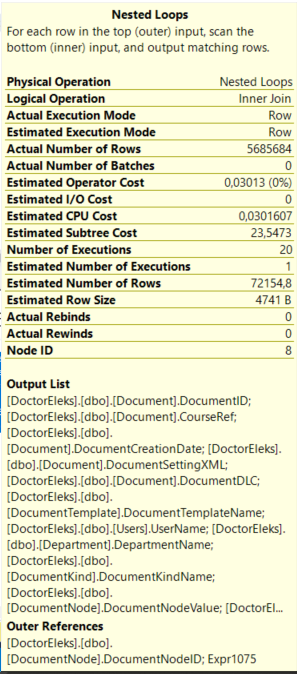Answer the question
In order to leave comments, you need to log in
How to optimize query (nested loops)?
There is a request, part of which eats up a lot of resources. Is there a way to optimize this miracle?
select
distinct
d.DocumentID
--,null
, c.PatientRef
, d.DocumentCreationDate as N'Дата створення документу'
,UserName as N'Користувач, який створив'
,DepartmentName as N'Відділ користувача'
,DocumentKindName as N'Група документу'
,DocumentTemplateName as N'Назва документу'
,DocumentDLC as N'Останнє зберігання документу'
,case when DocumentApproveStatusRef like N'APR' then N'Так' else N'Ні' end as Approved
from Document d
join (select CourseID, Patientref from Course) c on c.CourseID = d.CourseRef
join (select DocumentTemplateID, DocumentTemplateName, DocumentKindRef from DocumentTemplate) dt on dt.DocumentTemplateID = d.DocumentTemplateRef
join (select UserLogin, UserDepartmentRef, UserName from Users) u on u.UserLogin=d.DocumentUserRef
join (select DepartmentID, DepartmentName from Department) de on de.DepartmentID=u.UserDepartmentRef
join (select DocumentKindCode, DocumentKindName from DocumentKind) dk on dk.DocumentKindCode=dt.DocumentKindRef
join (select DocumentRef, DocumentNodeStaticGUIDRef, DocumentNodeValue from DocumentNode) dn1 on dn1.DocumentRef = d.DocumentID and dn1.DocumentNodeStaticGUIDRef in (
'd2c08bd8-3e52-4926-bbdf-4c4d37c968ad',
--'a07b13b1-8575-4d5e-afac-3e2b8d6e8171',
'bd6947b3-cee1-456c-9fc5-12efad75dec2'
)
join (select DocumentRef, DocumentNodeStaticGUIDRef, DocumentNodeValue from DocumentNode) dn2 on dn2.DocumentRef = (select T.[value].value ('.', 'int') from DocumentSettingXML.nodes('/DocumentSetting/PreviousDocumentRef') as T([value]))
and dn1.DocumentNodeStaticGUIDRef = dn2.DocumentNodeStaticGUIDRef
where
(select T.[value].value ('.', 'int') from DocumentSettingXML.nodes('/DocumentSetting/PreviousDocumentRef') as T([value])) is not null
and
d.DocumentCreationDate between @StartDate and @EndDate
and DocumentTemplateRef in (2125)
and dn1.DocumentNodeValue = dn2.DocumentNodeValue --жрёт ресурсы radish that prevents people from living.
radish that prevents people from living.
Answer the question
In order to leave comments, you need to log in
I would start with some rethinking - what does he do,
I think, for understanding, you can move the subselects in joins to temporary tables in memory (@table)
and look at the distinct object in the main select - there are big suspicions that you can get rid of it by grouping the values
Didn't find what you were looking for?
Ask your questionAsk a Question
731 491 924 answers to any question